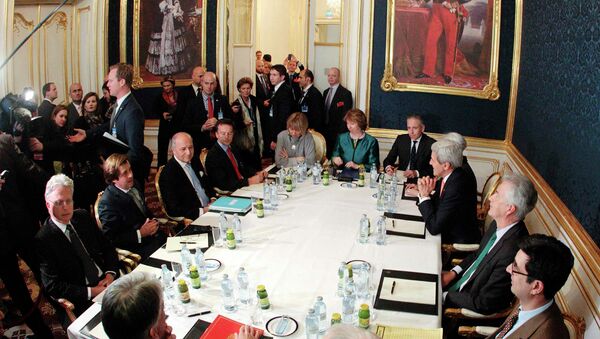VIENNA, November 24 (Sputnik), Daria Chernyshova — Foreign ministers of the sextet of international mediators, with the exception of China's Wang Yi who will arrive early Monday morning, have gathered in the Austrian capital to nail down a comprehensive deal that would lift the sanctions against Iran in exchange of country proving the peaceful nature of its nuclear program before the November 24 deadline. However, numerous obstacles stand in the way, and differences remain.
"At the moment we're focused on the last push, a big push tomorrow morning to try and get this across the line," UK Foreign Secretary Philip Hammond told reporters Sunday. "Of course if we're not able to do it, we'll then look at where we go from there."
According to Russia's Deputy Foreign Minister Sergei Ryabkov, after the last round of talks in Oman, held on November 10-11, the contested issues include Arak reactor, sanctions, uranium enrichment, transparency, and former military research.
Some progress has apparently been made over the course of the six days of talks in Vienna, as the talks entered a ministerial level. However, much have stayed behind the closed doors of the Palais Coburg where the talks and meetings are held.
At the moment, the pace of sanctions relief and uranium enrichment volume appear to be at the core. Iran seeks to operate as many centrifuges as possible, the West – to dismantle most of them. Iran wants UN and Western sanctions lifted all at once, the West – step by step to ensure Iranian compliance with the deal.
Deadline extension
On Sunday, a senior US official underlined the possibility of other options, different from a comprehensive agreement.
"[It is] only natural that less than 48 hours from the deadline we're discussing a range of options. An extension is one of those options," the diplomat said.
Speculations around the possibility of extending the deadline have been circulating throughout this past week in Vienna, with sources in the delegations or close to the negotiating teams giving conflicting reports on whether deadline extension is discussed or not.
The extension of the deadline beyond November 24 is associated with fears it could never be reached.
"If that isn't possible [reaching an agreement], the sides will need to see if they made enough progress to justify a short extension," Kelsey Davenport, Director for Nonproliferation Policy at Arms Control Association, has told Sputnik.
"Extending the talks is certainly preferable than walking away from the negotiating table. Nobody wins if the talks fail. But I think the extension will need to be short, because there are hardliners in Washington and particularly in Tehran that oppose the agreement," he said.
Another possibility is prolongation of the talks by a few more days, as once all the ministers are at the same place, reaching a deal might be easier.
Rare opportunity, high stakes
After a 12-year standoff, reaching the point when the sides are so close to finding an agreement seems truly a unique chance.
"This is a rare opportunity and it is a very important moment when losing this chance would become a grave mistake with hard consequences," the Russian deputy foreign minister said.
If reached, the deal will pave the way to lifting sanctions imposed on Tehran and restoring its role in international relations. In return, Iran will have to prove its nuclear program pursues peaceful goals.
"The price for Iran is huge: access to a very large amount of frozen assets, the ability to trade freely […] and the ability to reset relationships with the international community," the UK foreign secretary noted.
Iran is currently subject to a number of sanctions implemented by the UN Security Council, as well as economic sanctions by the European Union, the United States, and other countries.
Other players
But the P5+1 group, comprising Russia, the United States, the United Kingdom, France, China and Germany, is not the only player in the game. In particular, Israel and Saudi Arabia have vested interests in the talks, as well as influence on America's decision-making.
The reports of the talks' failure intensified after the Saudi foreign minister jetted into the Austrian capital for a brief meeting with US Secretary of State John Kerry on Sunday. Worrying signals also arose after Kerry's phone conversation with Israeli Prime Minister Benjamin Netanyahu.
Netanyahu claimed Saturday, that "the lack of agreement would be better than a bad deal." He added that a potential agreement could threaten Israel, the Middle East and the whole world.
Last year, the negotiating countries agreed to strike a long-term deal with Tehran by July 2014 that would guarantee a peaceful nature of the Iranian nuclear program, however the deadline was later extended to November 24.
On November 20, the International Atomic Energy Agency (IAEA) said that Tehran had not yet submitted any proposals on practical solutions to the disputes concerning its nuclear program.

